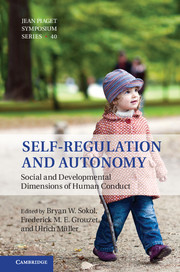Description
Self-Regulation and Autonomy
Social and Developmental Dimensions of Human Conduct
Coordinators: Sokol Bryan W., Grouzet Frederick M. E., Müller Ulrich
This book presents current research on self-regulation and autonomy, which have emerged as key predictors of health and well-being in several areas of psychology.
Language: English
Subject for Self-Regulation and Autonomy:
Self-Regulation and Autonomy
Publication date: 07-2015
Support: Print on demand
Publication date: 07-2015
Support: Print on demand
Self-Regulation and Autonomy
Publication date: 11-2013
312 p. · 15.7x23.5 cm · Hardback
Publication date: 11-2013
312 p. · 15.7x23.5 cm · Hardback
Description
/li>Contents
/li>Biography
/li>
Self-regulation and autonomy have emerged as key predictors of health and well-being in several areas of psychology. This timely volume brings together eminent scholars at the forefront of this research, which is taking place in disciplines including developmental psychology, developmental neuroscience, social psychology and educational psychology. The contributors present ideas and research findings on the development of self-regulation and autonomy, including their biological bases, antecedents and consequences. Editors Bryan W. Sokol, Frederick M. E. Grouzet and Ulrich Müller have shaped the volume's multidisciplinary perspective on self-regulation and autonomy to reflect the legacy of Jean Piaget, the trailblazing developmental psychologist whose work drew on a diverse body of research.
List of figures and tables; Series editor's preface; Preface; 1. Self-regulation and autonomy: an introduction Frederick M. E. Grouzet, Bryan W. Sokol and Ulrich Müller; Part I. Dialectic between Organismic and Social Processes: 2. The importance of autonomy for development and well-being Edward L. Deci and Richard M. Ryan; 3. Autonomy and self-regulation: the dialectic between organismic and social valuing processes Frederick M. E. Grouzet; 4. Development as emergence R. Keith Sawyer; Part II. Social Development: 5. Constructing the agent: developing conceptions of autonomy and selfhood Bryan W. Sokol, Ulrich Müller and Michael J. Chandler; 6. Revisiting the moral self construct: developmental perspectives on moral selfhood Tobias Krettenauer; 7. Facilitating autonomy in the family: supporting intrinsic motivation and self-regulation Wendy S. Grolnick and Jacquelyn N. Raftery; 8. 'It's a part of life to do with what you want': the role of personal choice in social development Larry Nucci; Part III. Self-Regulation and Autonomy at School: 9. Toward a social psychology of assimilation: self-determination theory in cognitive development and education Richard M. Ryan and Edward L. Deci; 10. Self-regulation and school success Angela Lee Duckworth and Stephanie M. Carlson; 11. Understanding explanatory talk through Vygotsky's theory of self-regulation Challis J. E. Kinnucan and Janet Kuebli; Part IV. Neurological Perspective: 12. Two-mode models of self-regulation and serotonergic functioning: divergent manifestations of impulse and constraint Charles S. Carver, Sheri L. Johnson and Jutta Joormann; 13. Neurodevelopmental processes of attachment and autonomy Allison C. Waters and Don M. Tucker; Index.
Bryan W. Sokol is an Associate Professor in the Department of Psychology and the Director of the Center for Service and Community Engagement at Saint Louis University. His research interests include the development of children's social understanding and socio-emotional competence, moral agency, and conceptions of selfhood.
Frederick M. E. Grouzet is an Associate Professor of Psychology at the University of Victoria. His research interests include the development of personal goals and values through socialization and personal growth experiences, as well as the relationships between goals, mental time travel, and well-being.
Ulrich Müller is an Associate Professor of Psychology at the University of Victoria. His research focuses on the development of self-regulation in young children, and the ways in which social interaction influences the development of self-regulation. Dr Müller has co-edited several books, including the Cambridge Companion to Piaget (2009).
Frederick M. E. Grouzet is an Associate Professor of Psychology at the University of Victoria. His research interests include the development of personal goals and values through socialization and personal growth experiences, as well as the relationships between goals, mental time travel, and well-being.
Ulrich Müller is an Associate Professor of Psychology at the University of Victoria. His research focuses on the development of self-regulation in young children, and the ways in which social interaction influences the development of self-regulation. Dr Müller has co-edited several books, including the Cambridge Companion to Piaget (2009).
© 2024 LAVOISIER S.A.S.




